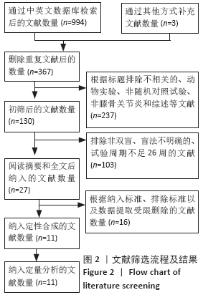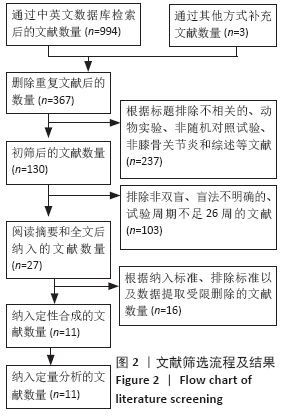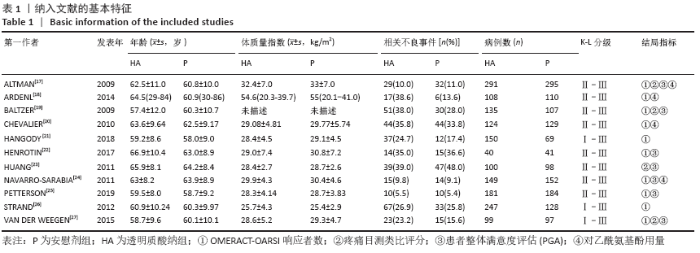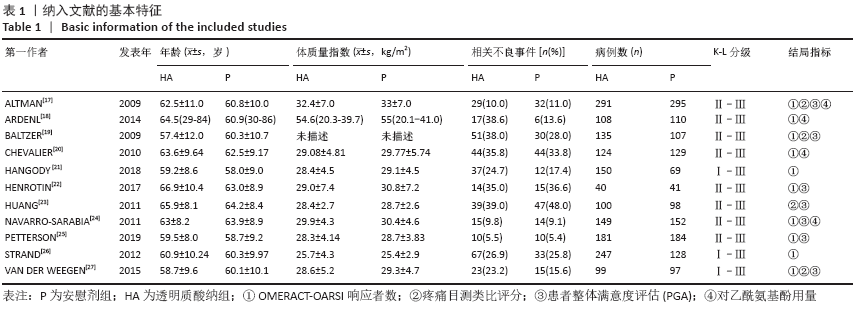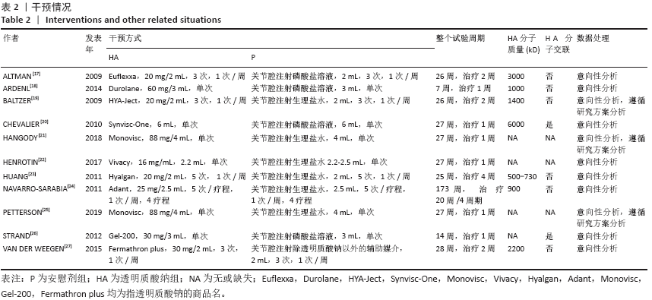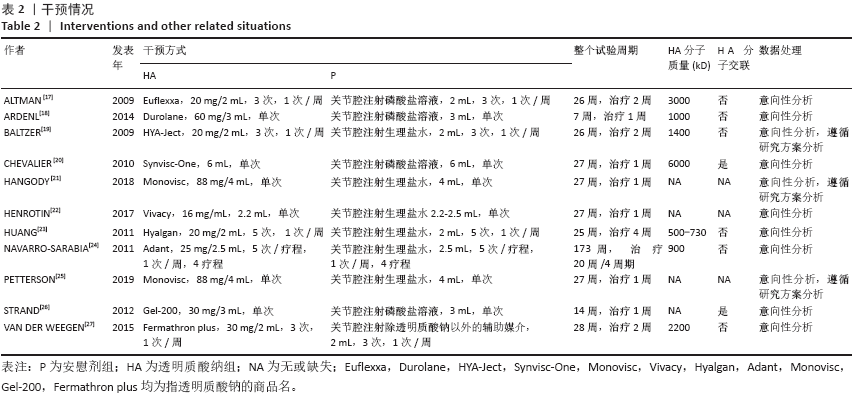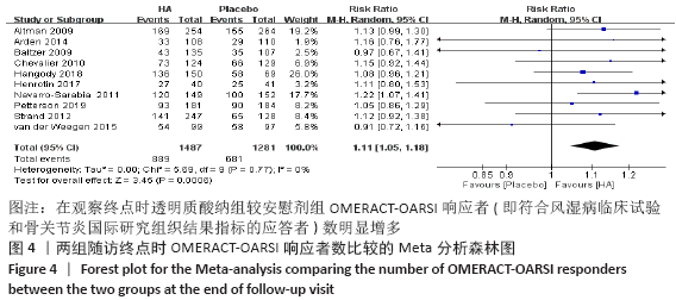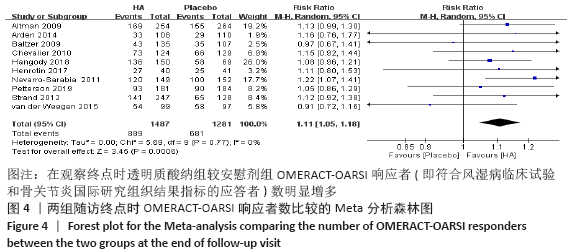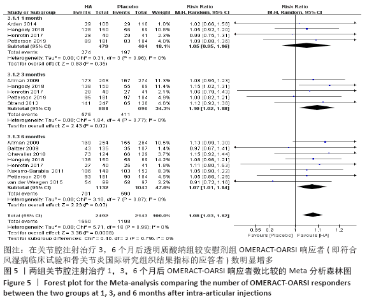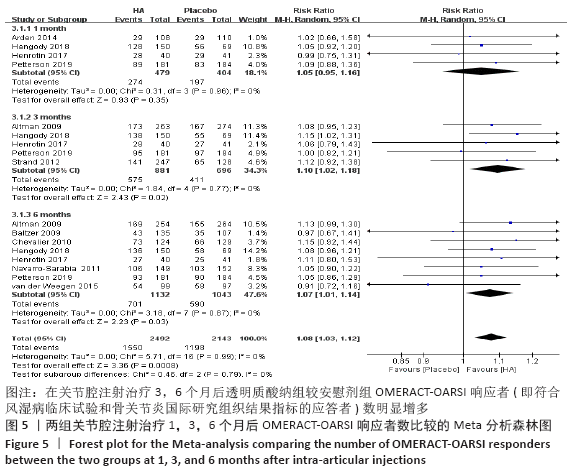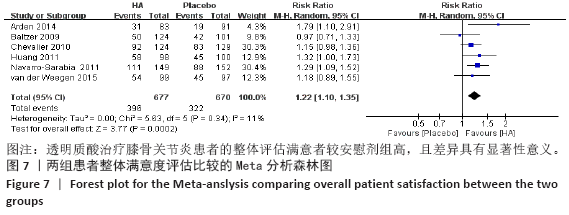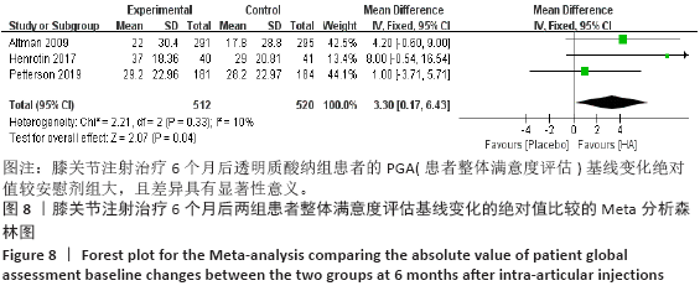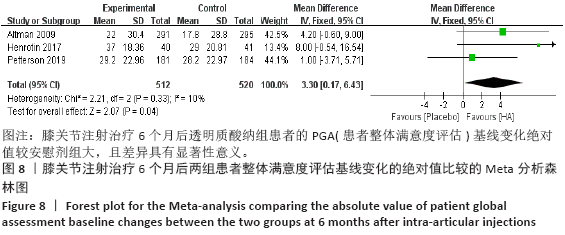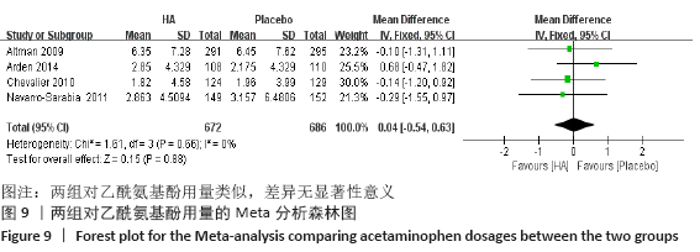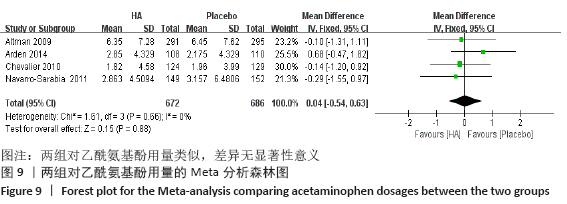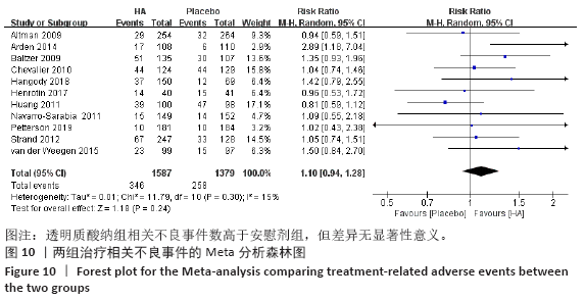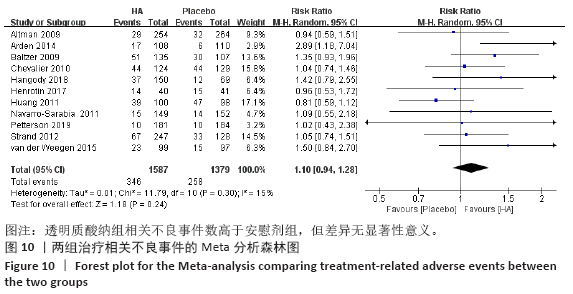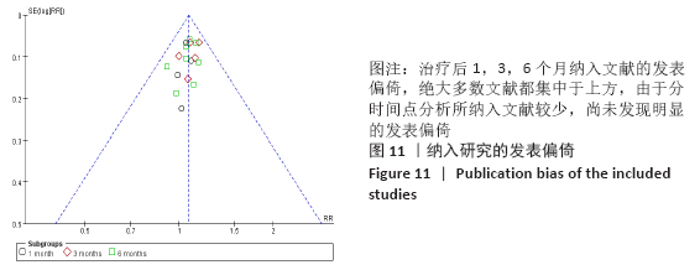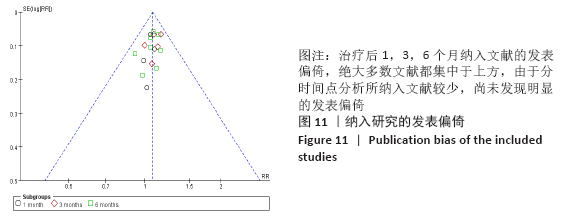Chinese Journal of Tissue Engineering Research ›› 2021, Vol. 25 ›› Issue (23): 3760-3766.doi: 10.12307/2021.051
Previous Articles Next Articles
Effectiveness of intra-articular injection of hyaluronic acid versus placebo in the treatment of early and mid-stage knee osteoarthritis: a Meta-analysis based on randomized, double-blind, controlled, clinical trials
Yang Wei1, Chen Zehua2, Yi Zhiyong3, Huang Xudong3, Han Qingmin3, Zhang Ronghua4
- 1The Third Clinical School of Guangzhou University of Chinese Medicine, Guangzhou 510405, Guangdong Province, China; 2The Fifth Clinical School of Guangzhou University of Chinese Medicine, Guangzhou 510405, Guangdong Province, China; 3Department of Sports Medicine, The Third Affiliated Hospital of Guangzhou University of Chinese Medicine, Guangzhou 510405, Guangdong Province, China; 4Jinan University, Guangzhou 510632, Guangdong Province, China
-
Received:2020-10-17Revised:2020-10-20Accepted:2020-11-11Online:2021-08-18Published:2021-02-24 -
Contact:Han Qingmin, MD, Chief physician, Professor, Doctoral supervisor, Department of Sports Medicine, The Third Affiliated Hospital of Guangzhou University of Chinese Medicine, Guangzhou 510405, Guangdong Province, China Co-corresponding author: Zhang Ronghua, MD, Chief physician, Professor, Doctoral supervisor, Jinan University, Guangzhou 510632, Guangdong Province, China -
About author:Yang Wei, MD candidate, Attending physician, The Third Clinical School of Guangzhou University of Chinese Medicine, Guangzhou 510405, Guangdong Province, China -
Supported by:A Pilot Project of Clinical Collaboration between Traditional Chinese and Western Medicine for Major and Difficult Diseases - Degenerative Osteoarthrosis (Guangdong), No. [2018] 3 (to HQM)
CLC Number:
Cite this article
Yang Wei, Chen Zehua, Yi Zhiyong, Huang Xudong, Han Qingmin, Zhang Ronghua. Effectiveness of intra-articular injection of hyaluronic acid versus placebo in the treatment of early and mid-stage knee osteoarthritis: a Meta-analysis based on randomized, double-blind, controlled, clinical trials[J]. Chinese Journal of Tissue Engineering Research, 2021, 25(23): 3760-3766.
share this article
Add to citation manager EndNote|Reference Manager|ProCite|BibTeX|RefWorks
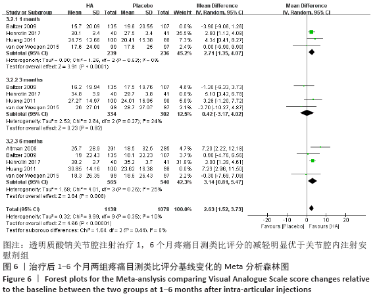
2.4.2 两组患者疼痛目测类比评分基线变化的差异 有5篇文献对比了两组治疗1,3,6个月后疼痛目测类比评分基线的变化[17,19, 22-23,27]。采用固定效应模型发现尽管所有时间点的差异均有显著性意义,但两组治疗1,3,6个月后各研究间统计学异质性均较高(P=0.07,I2=58%;P=0.03,I2=67%;P=0.12,I2=45%),改用随机效应模型,经敏感性分析分别剔除3个研究后异质性明显降低(P=0.53,I2=0%;P=0.27,I2=24%;P=0.26,I2=25%)[19,22-23],Meta分析结果(MD=2.71,95%CI:1.35-4.07,P < 0.000 1;MD=0.42,95%CI:-3.17-4.02,P=0.82;MD=3.14,95%CI:0.81-5.47,P=0.008),说明透明质酸治疗1,6个月疼痛的减轻明显优于安慰剂组,且差异有显著性意义,但治疗后3个月两组疼痛变化无显著差异。见图6。 "
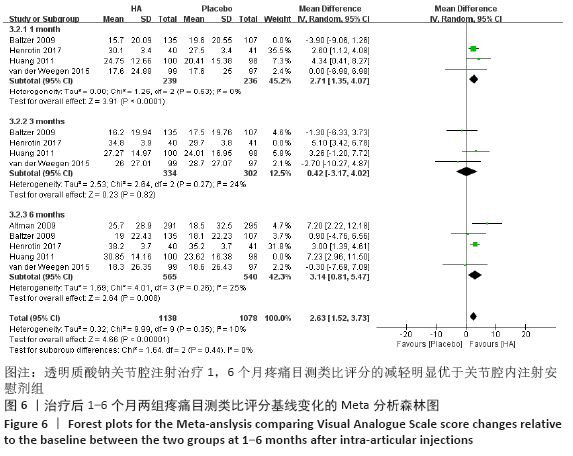
| [1] KOLASINSKI SL, NEOGI T, HOCHBERG MC, et al. 2019 American College of Rheumatology/Arthritis Foundation Guideline for the Management of Osteoarthritis of the Hand, Hip, and Knee. Arthritis Rheumatol. 2020;72(2):220-233. [2] HUNTER DJ, BIERMA-ZEINSTRA S. Osteoarthritis. Lancet. 2019;393(10182):1745-1759. [3] MILLER RE, SCANZELLO CR, MALFAIT AM. An emerging role for Toll-like receptors at the neuroimmune interface in osteoarthritis. Semin Immunopathol. 2019;41(5):583-594. [4] 中华医学会骨科分会关节外科学组,吴阶平医学基金会骨科学专家委员会.膝骨关节炎阶梯治疗专家共识(2018年版)[J].中华关节外科杂志(电子版),2019,13(1):124-130. [5] KNUDSON W, ISHIZUKA S, TERABE K, et al. The pericellular hyaluronan of articular chondrocytes. Matrix Biol. 2019;78-79:32-46. [6] GUO YL, YANG PY, LIU L. Origin and Efficacy of Hyaluronan Injections in knee osteoarthritis: Randomized, Double-Blind Trial. Med Sci Monit. 2018;24:4728-4737. [7] 中华医学会骨科学分会关节外科学组.骨关节炎诊疗指南(2018版)[J].中华骨科杂志,2018, 38(12):705-715. [8] 王斌,邢丹,林剑浩,等.关节腔内注射治疗膝骨关节炎的研究进展[J].中华关节外科杂志(电子版),2018,12(6):59-63. [9] FERREIRA DE ACA, GENOV IR, PEREIRA SRN, et al. Viscossuplementation for the treatment of osteoarthritis of the knee: a protocol for an umbrella review of systematic reviews with meta-analyses of randomized controlled trials. Medicine (Baltimore). 2020;99(37):e21813. [10] HIGGINS JP, GREEN S. Cochrane handbook for systematic reviews of interventions. Hoboken: John Wiley &Sons, USA. 2011. [11] LIBERATI A, ALTMAN DG, TETZLAFF J, et al. The PRISMA statement for reporting systematic reviews and meta-analyses of studies thatevaluate health care interventions: explanation and elaboration. Ann Int Med. 2009;151(4):W65-W94. [12] PHAM T, VAN DER HEIJDE D, ALTMAN RD, et al.OMERACT-OARSI initiative: osteoarthritis Research Society International set of responder criteria for osteoarthritis clinical trials revisited. Osteo Arthritis Cartilage. 2004;12(5):389-399. [13] HIGGINS JPT, SAVOVIĆ J, PAGE MJ, et al. Chapter 8: Assessing risk of bias in a randomized trial//HIGGIN JPT, THOMAS J, CHANDLER J, et al. Cochrane Handbook for Systematic Reviews of Interventions version 6.1 (updaeptemted Sber 2020). Cochrane, 2020. Available from www.training.cochrane.org/ handbook. [14] 汪鑫,林晓东,刘洪亮,等.全膝置换应用固定平台与活动平台假体疗效随访比较的Meta分析[J].中国组织工程研究,2021,25(12):1924-1929. [15] HAN YH, HUANG H,PAN JK, et al. Meta-analysis comparing platelet-rich plasma vs hyaluronic acid injection in patients with knee osteoarthritis. Pain Med. 2019;20(7):1418-1429. [16] 陈泽华,叶翔凌,陈伟健,等.系统回顾和量化倒走治疗膝骨关节炎的Meta分析[J].中国组织工程研究,2020,24(26):4251-4256. [17] ALTMAN RD, ROSEN JE, BLOCH DA, et al. A double-blind, randomized, saline-controlled study of the efficacy and safety of EUFLEXXA for treatment of painful osteoarthritis of the knee, with an open-label safety extension (the FLEXX trial). Semin Arthritis Rheum. 2009;39(1):1-9. [18] ARDEN NK, AKERMARK C, ANDERSSON M, et al. A randomized saline-controlled trial of NASHA hyaluronic acid for knee osteoarthritis. Curr Med Res Opin. 2014;30(2):279-286. [19] BALTZER AWA, MOSER C, JANSEN SA, et al. Autologous conditioned serum (Orthokine) is an effective treatment for knee osteoarthritis. Osteoarthritis Cartilage. 2009;17(2):152-160. [20] CHEVALIER X, JEROSCH J, GOUPILLE P, et al. Single, intra-articular treatment with 6 ml hylan G-F 20 in patients with symptomatic primary osteoarthritis of the knee: a randomised, multicentre, double-blind, placebo controlled trial. Ann Rheum Dis. 2010;69(1):113-119. [21] HANGODY L, SZODY R, LUKASIK P, et al. Intraarticular injection of a cross-linked sodium hyaluronate combined with triamcinolone hexacetonide (cingal) to provide symptomatic relief of osteoarthritis of the knee: a randomized, double-blind, placebo-controlled multicenter clinical trial. Cartilage. 2018;9(3):276-283. [22] HENROTIN Y, BERENBAUM F, CHEVALIER X, et al. Reduction of the Serum Levels of a Specific Biomarker of Cartilage Degradation (Coll2-1) by Hyaluronic Acid (KARTILAGE(R) CROSS) Compared to Placebo in Painful Knee Osteoarthritis Patients: the EPIKART Study, a Pilot Prospective Comparative Randomized Double Blind Trial. BMC Musculoskelet Disord. 2017;18(1):222. [23] HUANG TL, CHANG CC, LEE CH. Intra-articular injections of sodium hyaluronate (Hyalgan®) in osteoarthritis of the knee.a randomized, controlled, double-blind, multicenter trial in the asian population. Bmc Musculoskeletal Disorders. 2011;12(221):1-8. [24] NAVARRO-SARABIA F, CORONEL P, COLLANTES E, et al. A 40-month multicentre, randomised placebo-controlled study to assess the efficacy and carry-over effect of repeated intra-articular injections of hyaluronic acid in knee osteoarthritis: the AMELIA project. Ann Rheum Dis. 2011;70(11):1957-1962. [25] PETTERSON SC, PLANCHER KD. Single intra-articular injection of lightly cross-linked hyaluronic acid reduces knee pain in symptomatic knee osteoarthritis: a multicenter, double-blind, randomized, placebo-controlled trial. Knee Surg Sports Traumatol Arthrosc. 2019;27(6):1992-2002. [26] STRAND V, BARAF HSB, LAVIN PT, et al. A multicenter, randomized controlled trial comparing a single intra-articular injection of Gel-200, a new cross-linked formulation of hyaluronic acid, to phosphate buffered saline for treatment of osteoarthritis of the knee. Osteoarthritis Cartilage. 2012;20(5):350-356. [27] VAN DER WEEGEN W, WULLEMS JA, BOS E, et al. No difference between intra-articular injection of hyaluronic acid and placebo for mild to moderate knee osteoarthritis: a randomized, controlled, double-blind trial. J Arthroplasty. 2015;30(5):754-757. [28] Maheu E, Bannuru RR, Herrero-Beaumont G, et al. Why we should definitely include intra-articular hyaluronic acid as a therapeutic option in the management of knee osteoarthritis: Results of an extensive critical literature review. Semin Arthritis rheum. 2019;48(4):563-572. [29] ALTMAN RD, MANJOO A, FIERLINGER A, et al. The mechanism of action for hyaluronic acid treatment in the osteoarthritic knee: a systematic review. BMC Musculoskelet Disord. 2015;16:321. [30] 潘正烽,林奕鹏,李棋.玻璃酸钠分子量差异影响骨关节炎临床治疗获益的效应及机制分析[J].中华骨科杂志,2019,39(3):183-188. [31] CARLESSO LC, SEGAL NA, FREY-LAW L, et al. Pain susceptibility phenotypes in those free of knee pain with or at risk of knee osteoarthritis: the multicenter osteoarthritis study. Arthritis Rheumatol. 2019;71(4):542-549. [32] 荀杨芹,张元元,王建成,等.透明质酸钠治疗膝骨关节炎的临床实践指南质量评价[J].中国医药导刊,2018,20(10):584-589. [33] 管红珍,彭智聪,傅鹰.循证医学中文献证据等级标准的系统性综述[J].药物流行病学杂志, 2002,11(3):145-148. |
| [1] | Li Dadi, Zhu Liang, Zheng Li, Zhao Fengchao. Correlation of total knee arthroplasty efficacy with satisfaction and personality characteristics [J]. Chinese Journal of Tissue Engineering Research, 2021, 25(9): 1346-1350. |
| [2] | Wei Wei, Li Jian, Huang Linhai, Lan Mindong, Lu Xianwei, Huang Shaodong. Factors affecting fall fear in the first movement of elderly patients after total knee or hip arthroplasty [J]. Chinese Journal of Tissue Engineering Research, 2021, 25(9): 1351-1355. |
| [3] | Lü Zhen, Bai Jinzhu. A prospective study on the application of staged lumbar motion chain rehabilitation based on McKenzie’s technique after lumbar percutaneous transforaminal endoscopic discectomy [J]. Chinese Journal of Tissue Engineering Research, 2021, 25(9): 1398-1403. |
| [4] | Chen Junming, Yue Chen, He Peilin, Zhang Juntao, Sun Moyuan, Liu Youwen. Hip arthroplasty versus proximal femoral nail antirotation for intertrochanteric fractures in older adults: a meta-analysis [J]. Chinese Journal of Tissue Engineering Research, 2021, 25(9): 1452-1457. |
| [5] | Chen Jinping, Li Kui, Chen Qian, Guo Haoran, Zhang Yingbo, Wei Peng. Meta-analysis of the efficacy and safety of tranexamic acid in open spinal surgery [J]. Chinese Journal of Tissue Engineering Research, 2021, 25(9): 1458-1464. |
| [6] | Hu Kai, Qiao Xiaohong, Zhang Yonghong, Wang Dong, Qin Sihe. Treatment of displaced intra-articular calcaneal fractures with cannulated screws and plates: a meta-analysis of 15 randomized controlled trials [J]. Chinese Journal of Tissue Engineering Research, 2021, 25(9): 1465-1470. |
| [7] | Huang Dengcheng, Wang Zhike, Cao Xuewei. Comparison of the short-term efficacy of extracorporeal shock wave therapy for middle-aged and elderly knee osteoarthritis: a meta-analysis [J]. Chinese Journal of Tissue Engineering Research, 2021, 25(9): 1471-1476. |
| [8] | Gao Yan, Zhao Licong, Zhao Hongzeng, Zhu Yuanyuan, Li Jie, Sang Deen. Alteration of low frequency fluctuation amplitude at brain-resting state in patients with chronic discogenic low back pain [J]. Chinese Journal of Tissue Engineering Research, 2021, 25(8): 1160-1165. |
| [9] | Wang Yongsheng, Wu Yang, Li Yanchun. Effect of acute high-intensity exercise on appetite hormones in adults: a meta-analysis [J]. Chinese Journal of Tissue Engineering Research, 2021, 25(8): 1305-1312. |
| [10] | Kong Desheng, He Jingjing, Feng Baofeng, Guo Ruiyun, Asiamah Ernest Amponsah, Lü Fei, Zhang Shuhan, Zhang Xiaolin, Ma Jun, Cui Huixian. Efficacy of mesenchymal stem cells in the spinal cord injury of large animal models: a meta-analysis [J]. Chinese Journal of Tissue Engineering Research, 2021, 25(7): 1142-1148. |
| [11] | Zhao Zhongyi, Li Yongzhen, Chen Feng, Ji Aiyu. Comparison of total knee arthroplasty and unicompartmental knee arthroplasty in treatment of traumatic osteoarthritis [J]. Chinese Journal of Tissue Engineering Research, 2021, 25(6): 854-859. |
| [12] | Zhang Nianjun, Chen Ru. Analgesic effect of cocktail therapy combined with femoral nerve block on total knee arthroplasty [J]. Chinese Journal of Tissue Engineering Research, 2021, 25(6): 866-872. |
| [13] | Wu Gang, Chen Jianwen, Wang Shilong, Duan Xiaoran, Liu Haijun, Dong Jianfeng. Simple HyProCure subtalar stabilization in treatment of adolescent flexible flatfoot combined with painful accessory navicular bone [J]. Chinese Journal of Tissue Engineering Research, 2021, 25(6): 901-905. |
| [14] | Huang Dengcheng, Wang Zhike, Cao Xuewei. Intravenous, topical tranexamic acid alone or their combination in total knee arthroplasty: a meta-analysis of randomized controlled trials [J]. Chinese Journal of Tissue Engineering Research, 2021, 25(6): 948-956. |
| [15] | Li Yan, Wang Pei, Deng Donghuan, Yan Wei, Li Lei, Jiang Hongjiang. Electroacupuncture for pain control after total knee arthroplasty: a meta-analysis [J]. Chinese Journal of Tissue Engineering Research, 2021, 25(6): 957-963. |
| Viewed | ||||||
|
Full text |
|
|||||
|
Abstract |
|
|||||
